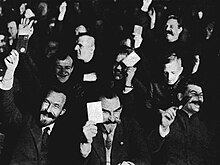15th Congress of the All-Union Communist Party (Bolsheviks)

The 15th Congress of the All-Union Communist Party (Bolsheviks) was held during 2–19 December 1927 in Moscow. It was attended by 898 delegates with a casting vote and 771 with a consultative vote.[1] The congress ended an inner-party struggle, as Leon Trotsky, Gregorii Zinoviev and other opponents of Joseph Stalin were expelled from the party.[2]
History
[edit]Background
[edit]In October 1927, the last Left Opposition members were expelled from the Central Committee elected by the 14th Congress, and in November 1927 Leon Trotsky and Grigory Zinoviev were expelled from the Party itself.
Repudiation of the United Opposition
[edit]The 15th Congress of the All-Union Communist Party (Bolsheviks) was convened in Moscow on 2 December 1927. This marked the first Soviet Communist Party Congress in two years, this despite the fact that party regulations called for annual meetings.[3] The gathering was retrospectively remembered as the "Congress of the Collectivization of Agriculture and of the Socialist Offensive on All Fronts" in the official party history of 1962, although a major part of time spent by the gathering related to internal party politics and the final ritualistic repudiation of the United Opposition of Trotsky, Zinoviev, and their supporters, effectively ending a two-year factional war.[3]
Oppositionists Christian Rakovsky and Lev Kamenev held brief speeches in front of the Congress.[4] Rakovsky's speech[5] was interrupted fifty-seven times by his opponents, including Nikolai Bukharin, Martemyan Ryutin, and Lazar Kaganovich.[4] Although, unlike Rakovsky, Kamenev used the occasion to appeal for reconciliation, he was nevertheless interrupted twenty-four times by the same group.[4]
Theses on Industrialization
[edit]The Central Committee adopted a set of theses regarding industrialization which had been prepared in October 1927 by the Central Committee.[6]
Election of a new Central Committee
[edit]The 15th Congress elected a new Central Committee to govern activities of the Communist Party during the period in between Congresses.
Central Committee: 71 members, 50 candidates to Central Committee membership Central Revision Commission: 9 members Central Control Commission: 195 members
Footnotes
[edit]- ^ Fifteenth Congress of the CPSU (Bolshevik) in The Great Soviet Encyclopedia, 3rd Edition (1970-1979)
- ^ Takiguchi, Junya (2023). "Stalinist political spectacle and the defeat of the opposition: The Fifteenth Congress of the Soviet Communist Party in 1927". History. 108 (379–380): 108–130. doi:10.1111/1468-229X.13331. ISSN 0018-2648. S2CID 257067749.
- ^ a b Moshe Lewin, Russian Peasants and Soviet Power: A Study of Collectivization. London: George Allen and Unwin, 1968; p. 198.
- ^ a b c Lewis H. Siegelbaum, Soviet State and Society Between Revolutions, 1918–1929, Cambridge University Press, Cambridge, 1992, pp. 189-190.
- ^ Christian Rakovsky; Speech to the Fifteenth Party Congress, (December 1927); First published in Report on the Fifteenth Party Congress, Communist Party of Great Britain, 1928; at the Marxists Internet Archive
- ^ Lewin, Russian Peasants and Soviet Power, p. 199.
Further reading
[edit]- J.V. Stalin, The Fifteenth Congress of the CPSU(b), 2-19 December 1927, Works: Volume 10. Moscow: Foreign Languages Publishing House, 1954 pp. 275–382.
External links
[edit]- Report of the Fifteenth Congress of the Communist Party of the Soviet Union, described as "official report with decisions and discussions."
- Fifteenth Congress of the All-Union Communist Party (Bolshevik) at the Great Soviet Encyclopedia (1979)
